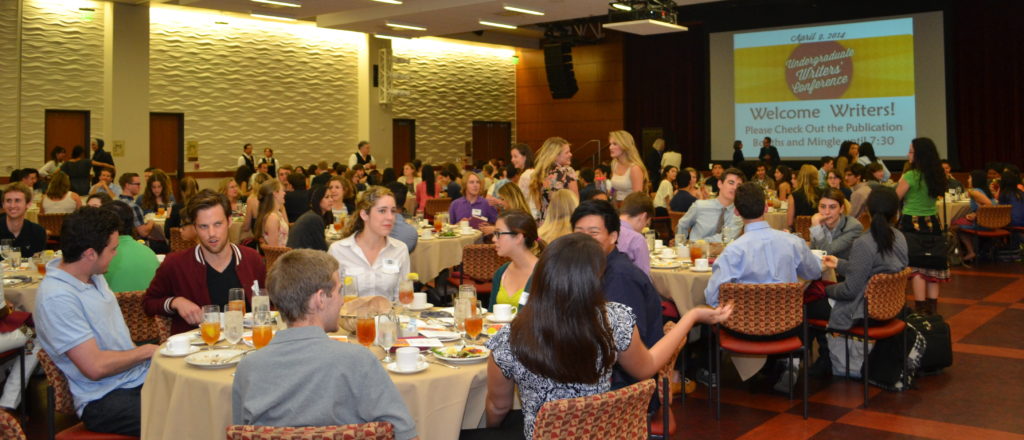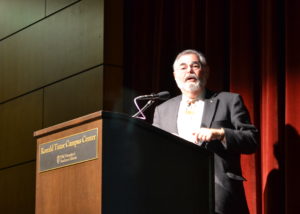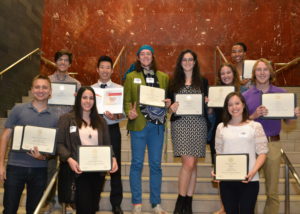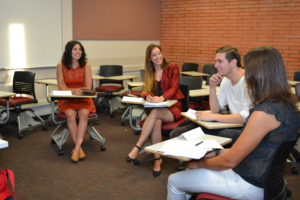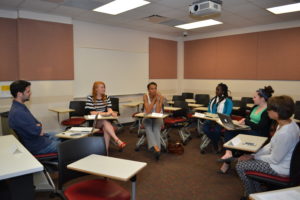11th Annual Undergraduate Writers’ Conference
Wednesday, April 9, 2014
Conference Director: Norah Ashe-McNalley
Keynote Speaker: Jonathan Kirsch
2014 Program
Analytical Essay
Researched Essay
Professional Writing/Moral Reasoning
Creative Work
USC Schwarzenegger Institute
USC Levan Institute
Photos
Analytical Essay (146 submissions)
Honorable Mention
Allegra Tepper
Lizzie in Real Life: Social and Narrative Immersion through Transmedia in The Lizzie Bennet Diaries
Allegra Tepper’s engaged and engaging style strikes the reader as the perfect tool for an analysis of new-generation “transmedia.” Focusing on The Lizzie Bennet Diaries as representative of the best of Twitter- and YouTube-mediated television, Tepper examines the way cultural classics, such as the work of Jane Austen, can be fruitfully translated into a new electronic idiom. The depth of her reading of the Diaries is impressive; the range of her discussion is even more impressive. Tepper demonstrates that cultural criticism can descend from the ivory tower to address an audience of appreciative, educated media consumers.
Honorable Mention
Rabia Kaiser
Untitled
Kaiser’s essay offers a sophisticated exploration of cultural appropriation in Lady Gaga’s “Aura”/”Burqa.” Drawing upon the theories of Antonio Gramsci and Edward Said, the essay persuasively demonstrates that Gaga’s seeming act of “counter-hegemony,” in which she presents a traditional symbol of “oppression” as exotic, alluring, and mysterious, actually reinforces the Western habit of commodifying and speaking for the Other. In doing so, the essay argues that Gaga’s sexualization of the veil, far from liberating Muslim women, oversimplifies their diverse experiences and affirms Western dominance.
2nd Prize
Brian Lentz
Modern Implications of Nazi Human Experimentation: The Hippocratic Oath and Hypocrisy in Medicine
“Searing” and “powerfully affecting” are not descriptors that come to mind when thinking of analytical essays, and yet these are precisely what Brian Lentz achieves with this essay. Everyone agrees that the Nazi experiments were horrific and profoundly unethical; but is it also unethical to use the results of those experiments as a means of furthering scientific understanding? This essay is a comprehensive and a necessarily unsettling look at the ethics of using scientific information gleaned from the Nazi’s experimentation: Lentz examines the issue from all angles, and successfully reminds us of the constant need to question the costs and risks of scientific progress.
1st Prize
Yihui (Ashley) Yang
Dear Female Chauvinist Pigs: You’re Not Actually Men
In her examination of our ubiquitous “raunch culture,” Ashley Yang systematically demonstrates that contemporary female sexual liberation, with its focus on the acquisition of sexual experience as a marker of—or even basis of—“successful” womanhood, has in fact perpetuated a masculine hegemony. Yang dismantles the belief that a willful and willing sexual subordination by women marks them as successful, sexually or otherwise. Her fluent expression and keen insight not only show that Yang has mastered the fundamentals of academic analysis but also position her as a participant in a significant cultural conversation.
Researched Essay (116 submissions)
Honorable Mention
Katie Gavin
Aural Sex: The Sound of the Female Orgasm in Pornography and Popular Music
Gavin’s approach to academic writing is quite ambitious as topics like women’s aural emanations in porn and in reality have so much shock value that it is genuinely difficult to maneuver within this arena and maintain one’s controlled, academic stance. However, Gavin pulls it off. Part biology paper, part musical analysis, part social and media commentary, Gavin’s examination argues that though these sexual vocalizations aren’t generally indicative of orgasm, they do serve many purposes. From stimulating the male partner to climax to providing a road map to the elusive female body, women’s sexual vocalizations turn out to be more complex than most of us have considered them to be. Thanks is owed to a skilled critical thinker for making a rather ordinary moan into so much more.
2nd Prize
Candice Tardiff
Joining at the Front: British Women’s Literary Responses to the First World War
In both the introduction and fourth chapter from her thoroughly researched honors thesis, “Joining at the Front: British Women’s Literary Responses to the First World War,” Tardiff displays extraordinary skill and sophistication as a writer and thinker. Beginning with her account of Flora Sandes, who, in addition to being the only British woman soldier to serve in the First World War, also happened to write the first book by a woman about the war, Tardiff explains that women writers had a significant role to play in the way England processed both its entry into and exit from World War I. Moreover, Tardiff’s chapter entitled, “‘Can It Be Shell Shock?’: Representations of Psychological Trauma,” shows that not only were women writing about the war—both fictionally and autobiographically—but that they were also taking up topics, such as shell shock, as early as 1918, whereas men didn’t address the topic until the late 1920s. Dispelling the myth that the war created a gender gap, which inevitably prioritized the experiences of men on the war front, Tardiff’s work on British women’s literature shows that British woman understood as well as men did that the Great War had changed the world had forever.
1st Prize
Oriah Amit
Putting Women on the Map: Regendering the Road in Literature and Film
Amit’s exploration of the representation of “the road” in 20th century literature and film reads easily, tempting the reader to set his/her proverbial academic pencil down and just enjoy the argument. Examining the works of both male and female writers, Amit places these various texts in juxtaposition with one another, ultimately claiming that although the women writers maneuver in the margins of the genre, they still manage to unbalance the road fantasies set up by the men. Her sharp analysis shatters expectations of undergraduate work and additionally solidifies a permanent place for women’s road narratives in this important genre. The quality of this piece ensures that Amit’s voice is likely to be heard at many a coming academic conference.
Professional Writing/Moral Reasoning (95 submissions)
Honorable Mention
Claire Baugher
Case Summary
In this legal summary, Baugher takes the emotional issue of the Supreme Court decision on the constitutionality of Proposition 8 and carefully examines the legal issues. The paper moves beyond emotional arguments to explain the nuances of legal precedent. For example, after noting the arguments for the preservation of traditional marriage, Baugher notes that “the question is not whether…tradition serves as a legitimate state interest, rather under what circumstances,” then explains the specific types of circumstances under which “tradition” can and cannot serve as support for a legal argument. Although presented as a legal document, with the necessary complexity and precision that such a document requires, the language is clear enough for a lay reader to understand the material and the issues at stake.
2nd Prize
James (August) Luhrs
Media Morte En Vida Sumus: A Historical, Psychological, and Literary Analysis of Public Attitudes on Grief and Mourning
In his essay on mourning, Luhrs offers a multifaceted approach that situates our contemporary perceptions of death within a larger social, psychological, and literary study. Beginning with a social history that details how our approach to grieving has changed in the twentieth century, Luhrs highlights the repercussions of internalizing and silencing grief. He then offers literature as a possible remedy for such unhealthy responses to death while reminding the reader of some of the potentially damaging depictions of death in popular culture. He seamlessly incorporates the different examples in his essay and offers a remarkably thoughtful look at something we all eventually confront: death.
1st Prize
Matthew Prusak
The Need for Economic Engagement with North Korea
In his thorough and sophisticated essay, Prusak calls upon the US to change its approach to North Korea. While the current US approach is one of economic isolation, in efforts to deter the continued human rights violations and nuclear development, Prusak argues that economically engaging North Korea will actually be more effective in achieving the United States’ policy goals. He not only shows why such an approach would be effective policy but also how it can benefit the US economically. His support for his argument is extensive and logical. Throughout his essay, he offers several alternative approaches, which he respectfully refutes. In response, his paper is not only an enlightening look into the Hermit Kingdom, but one that challenges readers to rethink the United States’ engagements abroad.
Creative Work (177 submissions)
Honorable Mention
Mia Galuppo
Higher Brain Function (play)
It’s difficult to be funny. Very difficult. Spoiler alert: Mia Galuppo’s one-act play is funny. The narrative involves four pets—dog, cat, hamster, and fish—waiting with trepidation while their owner goes through a tearful break-up with a philandering man. The banter between them, speculating on the demise of the relationship and their revenge plan for the ex-boyfriend, is so sharp and finely controlled that it taps into the rhythmic essences of vaudeville or classic radio comedy. The dog is sweet and affable and the cat is a stone-cold judgment queen, but what really got this judge to laugh-out-loud is the careful orchestration of the fish’s dialogue. See, the fish never contributes anything of substance, until it finally does. You’ll have to read the piece to find out, whereupon you’ll also discover the honesty embedded in Galuppo’s writing. Being funny is difficult, but pairing humor with genuine emotional resonance is an even greater trick.
Honorable Mention
Carrie Moore
Euola (short story)
“I’m going to keep asking until you’ve kissed me more than any of them.” So 20-year old Sunny warns when confronted with the reality of her much older husband’s romantic past in Carrie Moore’s “Euola.” In rendering the haunting threat of a spouse’s ex-lover appearing for dinner, Carrie Moore deftly spotlights the growing pains of evolving gender roles in what is a nuanced portrayal of post-World War II America. Can this young woman sculpt her own identity in the shadow of her husband’s much richer life? Moore’s work is a mature, at times heartbreaking treatment of this seemingly simple yet ultimately formidable question.
2nd Prize
Nina Varela
The Incredible Winter of Watauga County (short story)
Told from the perspective of 4 different characters, Varela’s story narrates a day in the life of a country family who grows and sells Christmas trees for a living. In its brief 7 pages, the story evokes life’s simple beauties that shine, like rare “freckles of gold,” against the mute, inarticulate pain of depression that laces its way through the generations of this family. Varela’s prose has a stark beauty as crisp as the winter she takes as her topic.
1st Prize
Orli Robin
Twirl (short story)
A poetic and devastating account. Orli Robin employs the conceit of 54 weekly Torah portions to provide an emotionally-rich, fragmented portrait of a young Jewish woman confronted with the inevitable intersection between the possible and the real. Rich sensory details, shrewd cultural observations, and gut-wrenching personal yearnings surface and re-submerge rhythmically throughout the piece like flashes of a life lived in memory. The fragments compile to create an unmistakable sense of a complete yet ultimately impenetrable world, culminating in a beautiful, heart-breaking final section that pins down the piece’s theme as neatly and naturally as a golden spiral unfolding within a rectangle.
USC Schwarzenegger Institute
2nd Prize
Lauren Taymor
Solving the Plastic Problem
1st Prize
Joshua Hwang
Outdoor Air Pollution: From Evidence to Comprehensive Action
USC Levan Institute Ethics Essay Contest
Ethics Essay Contest winners were also announced at the Writers’ Conference. Click here to view the winners.
Photos
